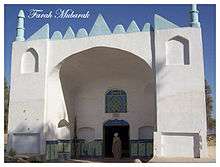Muhammad Jaunpuri
| Hazrat Syed Muhammad | |
|---|---|
 The Tomb of Syed Muhammad Jaunpuri | |
| Born |
Syed Muhammad Jaunpuri (سید محمد جونپورى) 14, Jamadi ul Awal 847 (September 9, 1443) Jaunpur, Uttar Pradesh, India. |
| Died | 19, Ziquada 910 (April 23, 1505 AD) |
| Resting place | Farah, Afghanistan |
| Spouse(s) |
|
| Children |
|
| Parent(s) |
|
Syed Muhammad Jaunpuri (Urdu: سید محمد جونپورى) (September 9, 1443 – April 23, 1505 AD), son of Syed Abdullah titled Syed Khan, was born in Jaunpur, Uttar Pradesh on Monday the 14th Jamadi-ul Awwal 847 Hijri corresponding to September 9, 1443 A.D. His grandfather, Syed Usman, came to India from Samarkand with his family and settled down in Jaunpur on the invitation of the Sharqiya King. He was the most famous Ulema, and a noted Alim-e-Deen (Scholar of the Religion). Syed Mohammed was a descendent of Imam Moosa Al-Kazim. There are twelve generations between Syed Mohammed and Imam Moosa Al-Kazim. Syed Mohammed claimed to be Imam Mahdi at Mecca in the 901 Hijri, and is revered as such by Mahdavia Community. He extensively traveled throughout India, Arabia and Khorasan.[1]
Sources
Jaunpur
The founder of Jaunpur was Sultan Feroz Shah Tughlaq, the Sultan of Delhi. It is situated on the bank of river Gomti, in then Allahabad Province. This city became very famous and developed as an academic centre during the period of the Tughlaq dynasty and Jaunpur Sultanate. They were great patrons of learned persons and scholars. It is said that there were 1100 Ulema in the city during the reign of Sultan Hussain of the Jaunpur Sultanate, who was a devoted admirer and follower of Syed Muhammed Jaunpuri. There were also a number of schools, Jamias (universities), mosques and hostels in Jaunpur at that time. Thus, it became very famous as a centre for Islamic studies in the East.[2]
Life
Genealogy
The genealogy of Syed Muhammad of Jaunpur is as follows:[3]
Ali ibn Abi Talib and Fatima Bint Muhammad
Hussain ibn Ali
Ali ibn Husayn Zayn al-Abidin
Muhammad al-Baqir
Ja'far al-Sadiq
Musa al-Kadhim
Ismail
Ni'amathullah
Jalaluddin
Yahiya
Yousuf
Abdullah
Najamuddin
Moosa
Khider
Syed Usman
Syed Abdullah
Syed Muhammed
Childhood and early life
Household
Syed Muhammed first wife, Bibi Alhadadi, was the daughter of his uncle, Syed Jalaluddin. He Married her in Jaunpur in 866H, when he was nineteen years old. Syed Muhammed and Bibi Alhadadi had two sons and two daughters together, Syed Mahmood Sani-e-Mahdi, Syed Ajmal, Bibi Khunza and Bibi Fatima. Syed Ajmal died early in his childhood.
The second wife was the daughter of Raja of Kalpi, who offered her hand to Syed Muhammad. He married her and gave her the name of Bibi Bhika.
Syed Muhammad married Bibi Malkan, the daughter of Miyan Lad-Shah Mahajir Patani who belonged to the Bayani tribe. Together they had a son and daughter, namely Syed Hameed and Bibi Hadaitullah.
The fourth wife of Syed Muhammad was Bibi Buwan. She was the descendant of Khaja Moinuddin Chishti. She bore him one son, Syed Ibrahim.
The fifth wife was Bibi Bhanmati, a niece of the Raja of Jaisalmer. She bore him one son, Syed Ali, who was buried in the wall of a prison in Ahmadabad, by the opponents of the Syed Muhammad.
Travels
He left Jaunpur along with his family and a small group of followers. Migrating from place to place and gathering more companions the Mahdavia group reached Farah in Afghanistan .
Pilgrimage and claim to be the Mahdi
By the age of 53 he embarked on the Hajj pilgrimage to Mecca, where in 1496 (901 Hijri), after circumambulating the Kaaba, he declared that he was the Promised Mahdi and whoever believes in him is a Momin.
He was generally ignored by the ulema of Mecca, and after staying in Mecca for nearly seven or nine months[4] he returned to India where he proclaimed himself Mahdi at Ahmedabad and later at Badhli (near Patan, Gujarat).
References
- ↑ http://khalifatullahmehdi.info/books/english/The-Mahdi-Maud-AHS.pdf
- ↑ The Mahdi Maud (AHS) by Syed Husain Balkhi
- ↑ http://khalifatullahmehdi.info/advent.asp
- ↑ http://mahdavia.info/promised_one/index.html